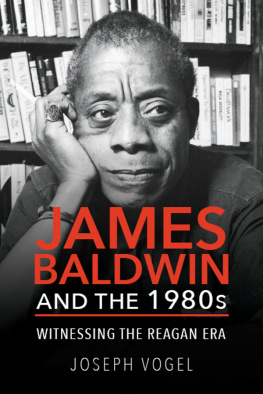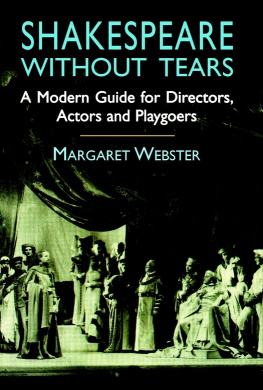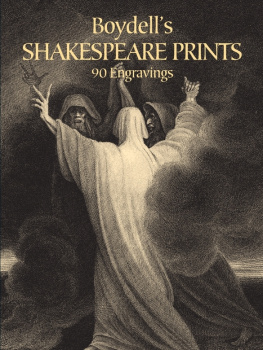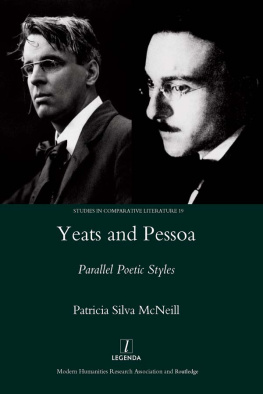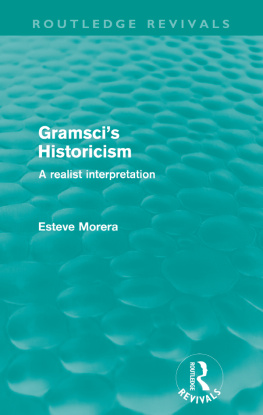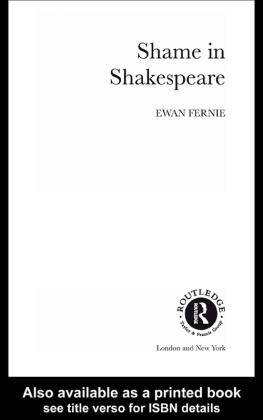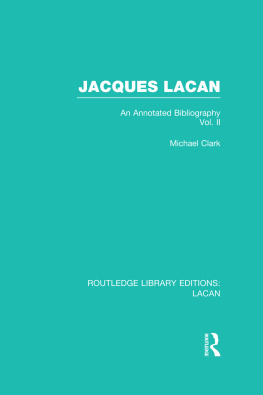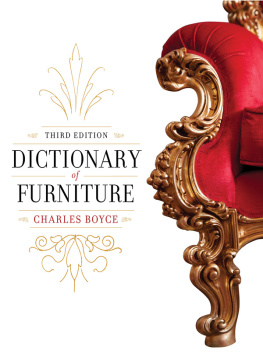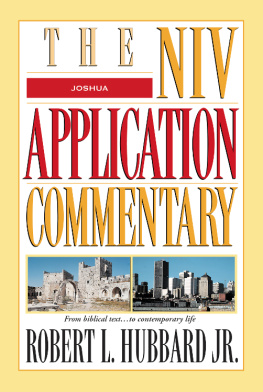Routledge Studies in Shakespeare
1 Shakespeare and Philosophy
Stanley Stewart
2 Re-playing Shakespeare in Asia
Edited by Poonam Trivedi and Minami Ryuta
3 Crossing Gender in Shakespeare
Feminist Psychoanalysis and the Difference Within
James W. Stone
4 Shakespeare, Trauma and Contemporary Performance
Catherine Silverstone
5 Shakespeare, the Bible, and the Form of the Book
Contested Scriptures
Travis DeCook and Alan Galey
6 Radical Shakespeare
Politics and Stagecraft in the Early Career
Christopher Fitter
7 Retheorizing Shakespeare through Presentist Readings
James ORourke
8 Memory in Shakespeares Histories
Stages of Forgetting in Early Modern England
Jonathan Baldo
9 Reading Shakespeare through Philosophy
Peter Kishore Saval
10 Embodied Cognition and Shakespeares Theatre
The Early Modern Body-Mind
Edited by Laurie Johnson, John Sutton, and Evelyn Tribble
11 Mary Wroth and Shakespeare
Edited by Paul Salzman and Marion Wynne-Davies
12 Disability, Health, and Happiness in the Shakespearean Body
Edited by Sujata Iyengar
13 Skepticism and Belonging in Shakespeares Comedy
Derek Gottlieb
14 Shakespeare, Romeo and Juliet, and Civic Life
The Boundaries of Civic Space
Edited by Silvia Bigliazzi and Lisanna Calvi
15 Shakespeare in Hate
Emotions, Passions, Selfhood
Peter Kishore Saval
First published 2016
by Routledge
711 Third Avenue, New York, NY 10017
and by Routledge
2 Park Square, Milton Park, Abingdon, Oxon OX14 4RN
Routledge is an imprint of the Taylor & Francis Group, an informa business
2016 Taylor & Francis
The right of Peter Kishore Saval to be identified as author of this work has been asserted by him in accordance with sections 77 and 78 of the Copyright, Designs and Patents Act 1988.
The Open Access version of this book, available at www.taylorfrancis.com, has been made available under a Creative Commons Attribution-Non Commercial-No Derivatives 4.0 license.
Trademark notice: Product or corporate names may be trademarks or registered trademarks, and are used only for identification and explanation without intent to infringe.
Library of Congress Cataloging-in-Publication Data
Saval, Peter Kishore.
Shakespeare in hate: emotions, passions, selfhood / Peter Kishore Saval.
pages cm. (Routledge studies in Shakespeare; 15)
Includes bibliographical references and index.
1. Shakespeare, William, 15641616Criticism and interpretation. 2. Hate in literature. 3. Anger in literature. 4. Self knowledge in literature. I. Title.
PR3069.H38S28 2014
822.3'3dc23 2015023536
ISBN: 978-1-138-85087-3 (hbk)
ISBN: 978-1-315-72450-8 (ebk)
Typeset in Sabon
by codeMantra
Contents
Shakespeare is the greatest of all dramatists of anger and hate. Everyone speaks of Shakespeare as the exemplary poet of love, but as a young man, I was transfixed by his hatreds. My life had not prepared me for the new feelings I found in Shakespeares rancorous and disobedient tirades: Timon inviting his flatterers to feast on empty bowls of water as he assails them with stones; Coriolanus telling the people of Rome that he hates them as he banishes them: these demonic, unruly passions challenged the antiseptic safety of my world. As I moved on to other plays, the spite, the rage, the enmity again intensified me. The willingness of these characters to expose their most undecorous feelings was addictive and uncomfortable at once, because I knew that I had these feelings in myself, but my white-collar education valued equanimity and coolness, and made passion seem stupid or immoral. No one is born hating, said so many sanctimonious teachers. People have to learn to hate. But in Shakespeare learning to hate seemed like one of the conditions of a fully lived life. Later, when I discovered the poetry of Dante, the tragedies of Aeschylus, or the characters of Dostoevsky, I realized that to appreciate their greatness was to be implicated in hatred.
I found that discussions of Shakespeare by teachers and critics had little to do with my experience of his dark, unsocial passions. Hate rarely got its due. Anger, of course, had the more respected pedigree: I was taught about the rage of Achilles, and the savage indignation of Juvenal; I read in Blake that the tigers of wrath are wiser than the horses of instruction. Si natura negat, I learned, facit indignatio versum: if nature denies, indignation will make verse. But hate rarely ever occasioned the response of wonder or pleasure. Anger occasionally gets a better press, says the classical scholar David Konstan, but hatred is almost universally condemned. Jack Levin has a theory why:
Until recently, the term hate referred to any intense dislike or hostility, whatever its object Beginning in mid-1980s, the term hate became used in a much more restricted sense to characterize an individuals negative beliefs and feelings about members of some other group of people because of their race, religious identity, ethnic origin, gender, sexual orientation, age, or disability status.
Such lines show us that there is an aesthetic pleasure in hating, and that part of the appeal of the greatest works of art is that they revitalize our capacity to hate. In 1939, the critic D.W. Harding insisted, in an essay entitled Regulated Hatred, that the pleasure we should take in Jane Austen is inseparable from the pleasure of hating. The readers who would be most likely to appreciate the art and power of her work are those who would turn to her not for relief and escape but as a formidable ally against things and people which were to her, and still are, hateful. He reminds us of a passage in Emma whose actual force so many readers are likely to miss:
Miss Bates stood in the very worst predicament in the world for having so much of the public favor; and she had no intellectual superiority to make atonement to herself or to compel an outward respect from those who might despise her.
Except, says, Harding, thats not what Jane Austen says. The passage above ends like this:
she had no intellectual superiority to make atonement for herself, or to frighten those who might hate her into outward respect.
Frighten; hate: This eruption of fear and hatred into the relationships of everyday social life is something that the urbane admirer of Jane Austen finds distasteful; it is not the satire of one who writes securely for the entertainment of her civilized acquaintances.
To assess the value of Hardings claims, and their validity for the art of Jane Austen, is, of course, outside the scope of my book. I mention the essay not in order to read Austens work, but to point to a possibility in literary criticism that may have escaped us: that part of the pleasure of great works of art is the pleasure of hating, and the delight and instruction of learning to hate well. The greatest Shakespeare critic, William Hazlitt, pointed to similar possibilities in his essay, On the Pleasure of Hating:
Nature seems made up of antipathies: without something to hate, we should lose the very spring of thought and action. Life would turn into a stagnant pool, were it not ruffled by the jarring interest of the unruly passions of men. The white streak in our own fortunes is brightened. Pure good soon grows insipid, wants variety and spirit. Pain is a bittersweet, which never surfeits. Love turns, with a little indulgence, to indifference or disgust; hatred alone is immortal. Animals torment one another without mercy: children kill flies for sport Even when the spirit of the age (that is, the progress of intellectual refinement) no longer allows us to carry our vindictive and headstrong humors into effect, we try to revive them in description, and keep the old bugbears, the phantoms of our terror and our hate, in the imagination.


